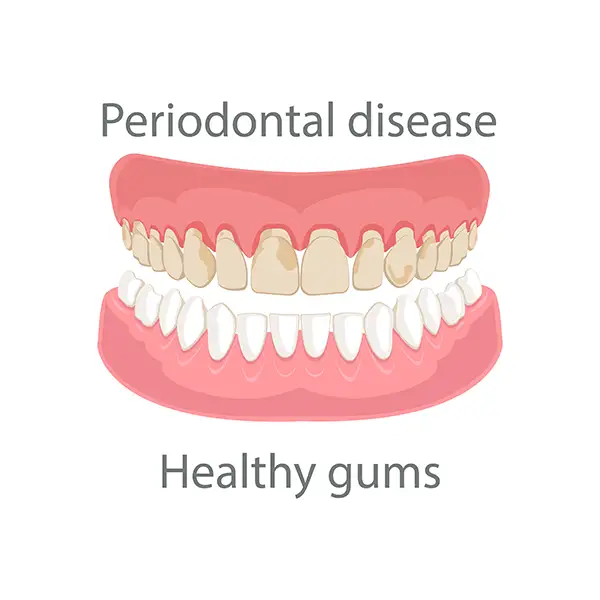Periodontics
Happy Valley, OR
 As a periodontics office, we here at Implant & Periodontics Solutions specialize in the prevention, diagnosis, and treatment of gum disease. Gum (periodontal) disease is one of the most common dental problems in the U.S. As a periodontics office, we here at Implant & Periodontics Solutions specialize in the prevention, diagnosis, and treatment of gum disease. Gum (periodontal) disease is one of the most common dental problems in the U.S.
Periodontal disease is an infection caused by the bacteria found in plaque, the thin biofilm that constantly forms around our teeth. In response to these bacteria, our immune system produces toxins. Unfortunately, these toxins also target our gums and other supportive tissues, resulting in the infection known as periodontal disease. Without treatment, periodontal disease can have serious consequences for your oral health.
There are specific factors our office staff looks for in patients to make a determination as to their candidacy for the procedure. Age is one of those factors. As individuals age, they typically have lower bone mass along the jaw than those of younger patients. With less bone mass, there may be an issue with being able to place dental implants because of how deeply they are set in the bone.
There are two major stages of periodontal disease: gingivitis and periodontitis. Some symptoms of gingivitis include gums that are swollen, red, or tend to bleed easily. Symptoms of periodontitis include gum recession, deep periodontal pockets, and severe inflammation. Persistent bad breath is also a major sign. If left untreated, periodontal disease may lead to tooth loss.
Treatment for gum disease varies from patient to patient. In most cases, the symptoms of gingivitis can be treated and reversed with simple improvements to your oral hygiene. Daily brushing and flossing with the proper technique should return your gums to a healthier state. Regular checkups and cleanings are also key.
Periodontitis is a little more serious and usually requires a procedure known as scaling and root planing. During the procedure, we remove plaque and tartar deposits to eliminate the growth of bacteria. Severe instances of gum recession may require a soft tissue graft.
The single most important aspect of oral health care is for the patient to diligently brush and floss their teeth multiple times a day. This not only keeps the teeth clean and gums healthy, but it also wards off the chances of decay settling in and deteriorating soft and hard tissues of the oral cavity. Damage to teeth and gums can also come by way of injury, as well as disease and neglect. When there has been a considerable bone loss as a result of any of these situations, one possible solution is regeneration which simply means regrowth. Although it does require sedation, the procedure itself is rather straightforward and can be finished with just one office visit.
Periodontal disease can have severe and widespread consequences for your oral health. Once the disease spreads to your connective ligaments and your underlying bone, it can result in irreversible damage. In some cases, this damage can be so severe that you need a bone or gum graft, especially during dental implant treatment.
Once gum disease progresses to the advanced stages, surgery can be used to alleviate some of the symptoms and, most times, slow the progressive nature of the disease. One such surgery is known as a gingivectomy. This is a simple procedure involving the removal of diseased gum tissue from the mouth which allows new, healthy gum tissue to grow.
It is important for patients who have a periodontal disease diagnosis to begin treatments as soon as possible. While it is difficult to accept, delaying the treatment will only hinder the effectiveness and allow the disease to progress even further, making symptoms worse. It is important to realize that while treatments do take a commitment to the patient, they are not always invasive, expensive, or painful. In the earliest stages, there are a few non-surgical treatment options available. It is why it is important to not only diagnose the disease as early as possible but to also begin treatment, so all options are available.
The best way to combat periodontal disease is with prevention. If you are at a greater risk for gum disease, you may need to pay special attention to your gums during brushing and flossing. Risk factors for periodontal disease include:
| • |
Smoking and tobacco use
|
| • |
Age
|
| • |
A family history of gum disease
|
| • |
Stress or anxiety
|
| • |
Certain medications that restrict saliva flow
|
| • |
Bruxism or teeth grinding
|
| • |
Poor nutrition |
If you are at greater risk for gum disease or exhibit any symptoms, Dr. Owen Trinh may suggest improved periodontal maintenance. When brushing and flossing it can be helpful to remind yourself why you are doing it. Proper techniques should result in more effective plaque and tartar control.
Do you wonder how gum surgery can help you live a more fulfilled, happy life? We know you have concerns, and we want to make you as informed as possible in order to make the best decisions that are right for you. We're here for you with your journey towards better oral health.
Schedule Your Appointment
To find out if you have gum disease call 623-556-5442, and schedule your appointment now! |